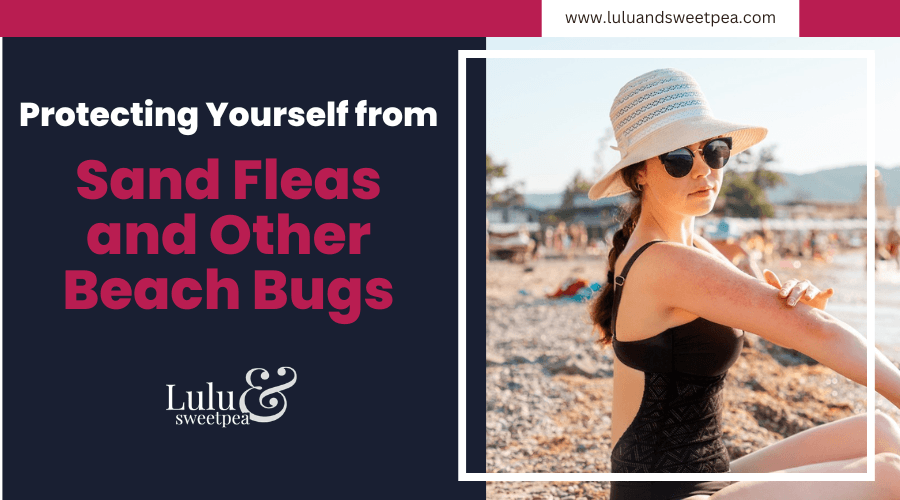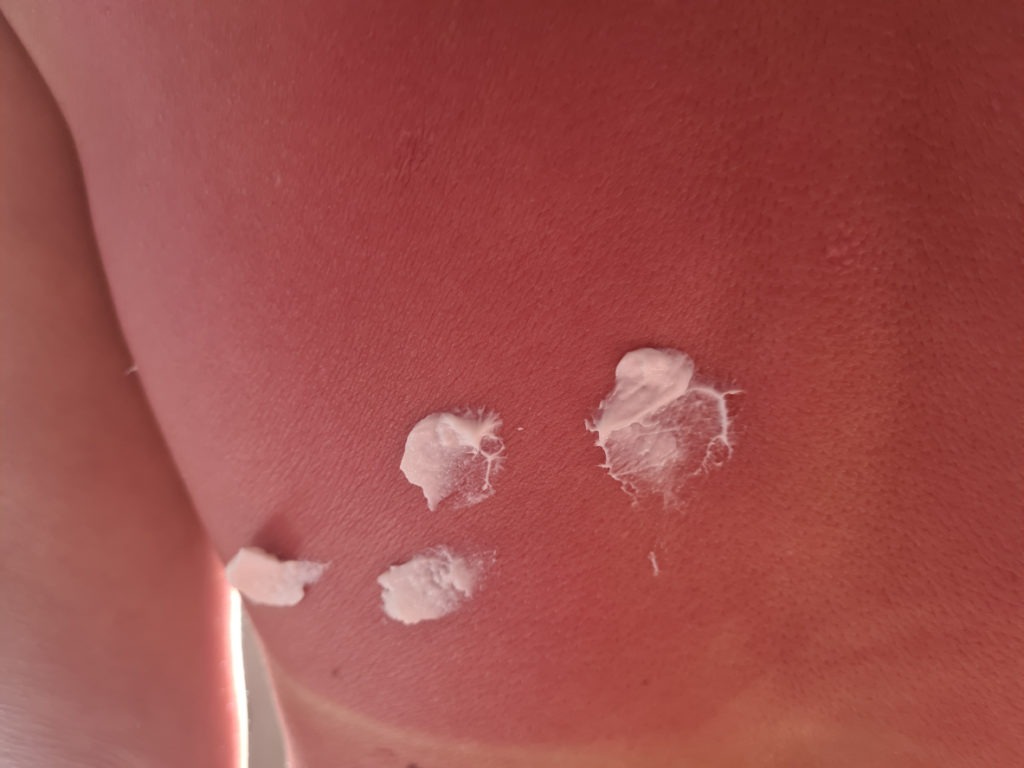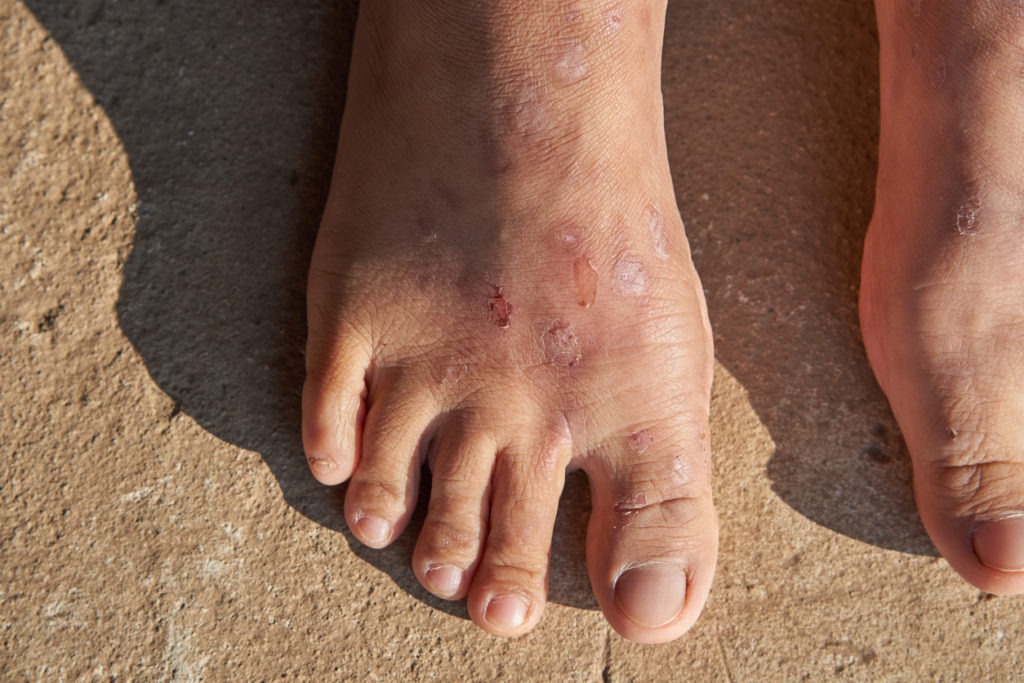Heading to the beach to enjoy some sun and sand? Make sure to protect yourself from sand fleas, mosquitoes, and other common beach pests. From light-weight clothing to insect repellent, there are several ways to protect yourself and your family from the bites of these tiny creatures.
What are Sand Fleas?
Sand fleas are small, parasitic insects that live in sandy areas near the beach. They are commonly mistaken for other beach bugs such as crabs and mites, but can be easily identified by their hopping motion. The bugs feed on humans and animals, typically biting near the ankles and feet, leaving small, red bumps.
Sand fleas can be difficult to prevent, but wearing insect repellent and avoiding areas with large concentrations of the bugs can help lessen their impact. They don’t typically bite humans, but their bites can be very painful and irritating.
Beach bugs are small, bothersome insects that are often found near shorelines, usually in sandy areas. They feed on decaying plant matter and can be found in large numbers near lakes, ponds and beaches.
Beach bugs are most active during summer months when humidity and temperatures are high. While they are a nuisance, beach bugs do not carry diseases and are not known to spread any illnesses.
All in all, beach bugs can ruin your day at the beach if you’re not careful. It’s important to take necessary precautions when preparing for a beach trip and be aware of pests like sand fleas, ticks and other insects that may be present. Wearing long pants, closed-toed shoes and using bug spray are all necessary steps to guard yourself against bug bites from beach bugs.
How Can I Protect Myself from Sand Fleas and Beach Bugs?
Wear light-colored clothing that covers as much of your skin as possible when visiting the beach. Beach bugs, such as mosquitoes, are attracted to dark clothing, so wearing light-colored clothing can help reduce your likelihood of being bitten.
If possible, try to wear long sleeves and long pants to cover your arms and legs, and opt for light-colored hats or headscarves to provide extra protection from beach bugs. Additionally, use an insect repellent containing at least 20% DEET to further protect your skin from beach bugs.
Make sure to apply insect repellent with DEET to ward off pesky sand fleas when visiting the beach. The bugs at the beach can be annoying and pose a nuisance, so it is important to be prepared.
Sand fleas, or beach bugs, are tiny insects that bite and can cause skin irritation and discomfort. They are most active at night, but can be active during the day as well, so it is important to remain vigilant. DEET insect repellent is a great way to protect yourself and your family from these annoying beach bugs.
Next, it is important to be aware of the potential beach bugs that you may encounter. It is recommended to avoid sitting or lying directly on the sand in order to minimize exposure, and keep your feet off the ground whenever possible. The presence of beach bugs can make any beach trip unpleasant and uncomfortable, so taking these precautions is essential for a pleasant experience.
Natural Ways to Repel Sand Fleas and Beach Bugs
A great natural way to repel sand fleas is to create a barrier of essential oils such as tea tree oil, eucalyptus oil and citronella oil around your beach area. These oils not only repel sand fleas, but they can also deter other beach bugs such as mosquitoes or ticks. Simply pour a few drops of each oil around your beach area and enjoy the outdoors with no irritating pests. These essential oils are not only effective but they are also natural and safe to use around children and pets.
It’s also helpful to sprinkle ground cloves or cayenne pepper around the area to repel the sand fleas naturally. Beach bugs, or sand fleas, can be a nuisance on the beach. They can bite, leaving red and itchy welts on the skin. To avoid these unwanted guests, wear light-colored clothing and avoid going on the beach at dawn and dusk, when they are most active. In addition, applying sunscreen to exposed areas can also help keep the beach bugs away. Finally, wearing shoes is recommended to prevent bites on the feet.
Furthermore, certain herbs such as lavender or mint can be an effective way to keep sand fleas away from your beach area. This natural method is not only affordable but also creates a relaxing and fragrant environment for those who visit the beach. Therefore, by using herbs, you can prevent sand fleas from taking over the beach and continue enjoying fun visits at the shore.
Things to Keep in Mind
Bugs tend to be attracted to darker colors and strong odors, so light colors and insect repellent should help keep them away. If you’re worried about bringing a bottle of insect repellent to the beach, you can look for non-aerosol sprays with natural ingredients, such as lemon eucalyptus oil. You can even purchase wristbands that contain natural repellents like citronella or peppermint to deter the beach bugs.
Remember to keep your area clean and clear of food, as bugs are attracted to food residue. Lastly, if the bug population is particularly high, you may want to consider avoiding the beach altogether.
You should also avoid wearing perfumes or scented lotions, as this can attract bugs. Beach bugs are a common nuisance on many beaches that can be annoying and painful. They include sand flies, no-see-ums, and biting midges. While these bugs may not be fatal, they can cause uncomfortable bites and stings. Therefore, it’s best to take precautions to prevent them from bothering you. Wearing light-colored clothing, applying insect repellent, and avoiding scented products can help keep beach bugs at bay.
In conclusion
While beach bugs can be an annoyance, there are ways to protect yourself when outdoors. If you find yourself in a situation where you’re surrounded by pesky bugs, beach umbrellas and mosquito nets provide great protection and still allow you to enjoy your beach experience. With the right preparation and foresight, keep the bugs away and enjoy your time at the beach.


